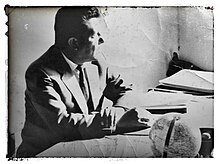Gaston Suarez
Gastón Suárez (January 27, 1929 - November 6, 1984) was a Bolivian novelist and playwright. Suárez was born in the town of Tupiza in southern Potosí, Bolivia.
A self-taught writer, he dropped out of school in the third grade of primary school, after a traumatic event in which his teacher suffered an epileptic fit while reading to him. Paradoxically, his mother, also a rural teacher, agreed that he left school and dedicated himself to instructing him at home. At the age of ten, and after reading the books A Fifteen-Year-Old Captain by Jules Verne and Jerry of the Islands by Jack London, he vows to one day become a writer.
He held various trades: railway worker, rural teacher, miner, truck driver, bank employee, journalist, etc. In the late 1950s he decides to keep his promise. He retires from his job at the Banco Minero de Bolivia and decides to buy a truck to travel and get to know his country. During almost two years of travels and journeys throughout Bolivia, he simultaneously writes several of his stories and finishes the first draft of his play Vértigo. A few months later he decides to live from his literary production and dedicates himself completely to literature.
Through his travels and his multifaceted jobs, he had the opportunity to get to know and feel Bolivian life in its most diverse social strata, which is reflected with a particular vision in the topics he touches on, whether they be from the city, the countryside Or the mines.
"...Suárez goes beyond the simple fact, beyond the anecdote and subtly discovers transcendental situations. Keen observer of human behavior, he is the most outstanding psychological introversion writer of the new promotion of Bolivian narrators... & # 34;
At the beginning of 1962, together with several writers and artists such as Fernando Diez de Medina, Enrique Arnal, Piotr Zubrzycki and Sergio Suárez Figueroa, he started and was part of the first cultural and information magazine in Bolivia. NOVA Magazine, monthly, reached the public for almost three years and had a hemispheric reach and recognition.
His first book of short stories Vigilia para el último viaje was published in 1963, from which Iluminado was extracted to be included in several anthologies of Spanish-American short story writers, as an outstanding example of short story.
Among his works, El Gesto stands out, another book of short stories of which The Stranger and the Silver Candelabra and Mafalda's Diary are the most accomplished pieces.
In 1967 Suárez published his first play, Vértigo. A work of deep social and philosophical content that narrates the life of a man who after twenty years in prison is released and tries to rebuild and reunite his seven children who have taken diametrically different paths in life. Vertigo was staged and presented at the “Julian Youth Days” in 1967, winning first prize.
His most important work is Mallko, published in 1974. Official reading text in Bolivia, Spain and in the signatory countries of the Andrés Bello Agreement. It was included in the Hans Christian Andersen Award Honor List as an "outstanding example of literature of international importance."
In 1979, declared the International Year of the Child, he published The Adventures of Miguelín Quijano, a short novel in which Suárez makes use of allusions to Quixotic characters to achieve a beautiful parable that incites the creative imagination and the children's interest in the immortal book by Cervantes Saavedra.
In 1981, he published Después del Invierno, a drama that stages the dilemma of two brothers (Melitón and Benjamin) confronted with the decision to continue living together taking care of their father (Adrián), already elderly and sick, or leave the parental home and live their own lives.
He was president of the Bolivian Writers Union (UBE) until his death. Gastón Suárez died in the city of La Paz on November 6, 1984, the victim of a sudden heart attack.
Contenido relacionado
Loved nerve
The Apartment
Misery (film)

